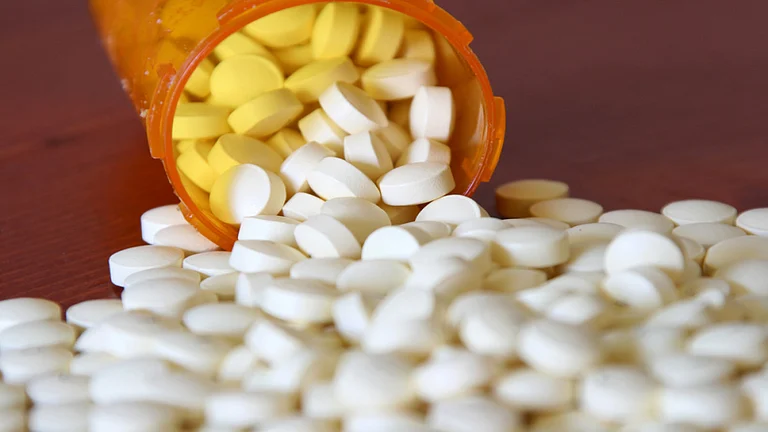Donald Trump signed an executive order on May 13, aimed to reduce prices of US prescription drugs by over 59%, bringing them at par with other developed nations. The order aims to revive Trump’s contentious ‘Most Favoured Nation’ drug pricing model, that was caught into legal battle after it was first proposed during his last tenure.
Trump Inks Order to Bring Down US Drug Prices, But Skips Details on Generics Drugs
India’s pharma industry left guessing as Trump revives Most Favoured Nation drug pricing policy
The order aims to benchmark prescription drug prices against the ones abroad, without specifying which countries will make it to the list for benchmarking. However, he did hint that he would be targeting developed countries, stating that, “there are some countries that need some additional help, and that’s fine.”
However, that wasn’t all that Trump missed to provide details on. White House officials also gave away with any specifics over which medications will the order apply to, leaving industry watchers, shareholders and Indian pharma firms on tenterhooks, yet again. All that the Trump administration hinted on this matter was that the order will have a bearing on the commercial market as well as Medicare and Medicaid.
With much of India’s drug exports to the US comprising of drug generics, the lack of specifics on its pricing has left Indian Pharma bewildered. A lack of clarity on whether generics will be exempt from the proposed Most Favoured Nation (MFN) pricing policy is raising concerns across the pharmaceutical industry.
Tushar Manudhane, pharma analyst at Motilal Oswal Financial Services, flagged that the ambiguity in Trump’s announcement makes it too early to gauge the potential impact. “We don’t know the details yet—whether it’s linked to international reference pricing or if generics will also fall under its scope, there’s a lot that is still unclear,” he said.
Generics account for 90% of prescriptions in the US but just 13% of total drug spending. They are typically far cheaper than branded drugs and often reflect competitive global pricing.
Trump’s order targets “unfair pricing disparities,” largely seen in the branded segment. Americans pay over three times what other OECD countries pay for branded medicines, even after manufacturer discounts.
To that effect, the Mehul Sheth, and Divyaxa Agnihotri, analysts at HDFC Securities hold the view that generic companies are unlikely to have any heavy impact. Meanwhile, they do see some pressure on Sun Pharma as its specialty business (15-18% of sales) in the US may see some impact of MFN price ceiling for a few of its products. Sun Pharma’s specialty products like Ilumya, Winlevi, Odomzo, Cequa, are marketed in other developed markets, whereas other products like Levulan, Absorica, Bromsite, Xelpros, Yonsa, Sezaby, Sprinkle portfolio, and the recently-approved Leqselvi (Deuruxolitinib) are marketed only in the US.
Echoing similar sentiments, analysts at Nomura believe that if implemented, the executive order on drug pricing is expected to significantly affect branded and specialty drug sales in the US. Among Indian pharmaceutical companies, Sun Pharma has the greatest exposure to the US specialty segment, with Nomura estimating revenue for the segment at around $1.04-bn for FY25, with Ilumya alone contributing around $570-mn, more than half of which is likely supported via Medicare Part B.
“Ilumya’s listed price in the US is estimated to be nearly four times that in other developed markets. As such, a move towards international reference pricing could materially impact Sun Pharma’s revenue and earnings. We believe this may also deter other Indian drugmakers from further investing in the US specialty space,” Nomura wrote.
Additionally, the order could also reduce the addressable market for complex generics and biosimilars, which typically sell at a modest 30–40% discount to branded drugs and face limited competition. These products are particularly vulnerable to pricing pressure. However, standard commoditised generics, with five or more market players and significant existing price competition are less likely to see further price erosion, given the cost structures involved.
Positively, if measures are introduced to limit the high bargaining power of trade intermediaries, this could improve price realisation and accelerate biosimilar adoption over time, Nomura believes.
Regardless of the air of uncertainty hovering around Trump’s drug pricing plans, domestic pharma played cheered for the lack of specifics, jumping on to hope of bets of limited fallout from the order. Likewise, shares of Sun Pharma, the drugmaker with the most to lose, rebound 1% after last session’s deep plunge.
Other pharma stocks like Cipla, Dr Reddy’s Laboratories, Divi’s Laboratories, Aurobindo Pharma, Ajanta Pharma, Granules India, Ipca Labs and Granules India surged as much as 4% intraday. With these gains, the Nifty Pharma index also shot up 1.6%.
